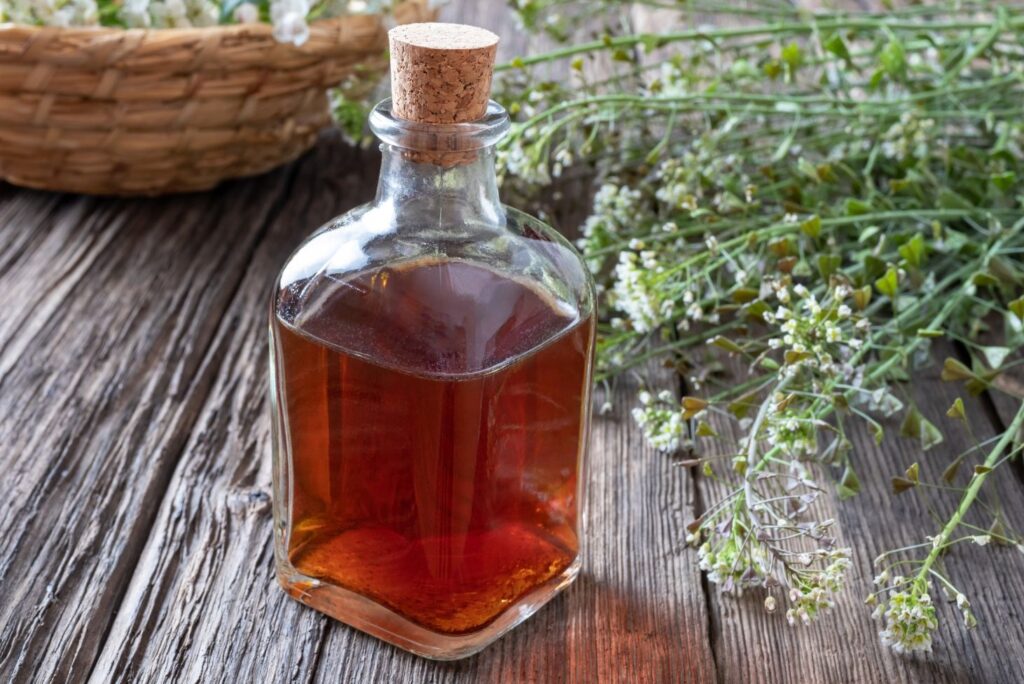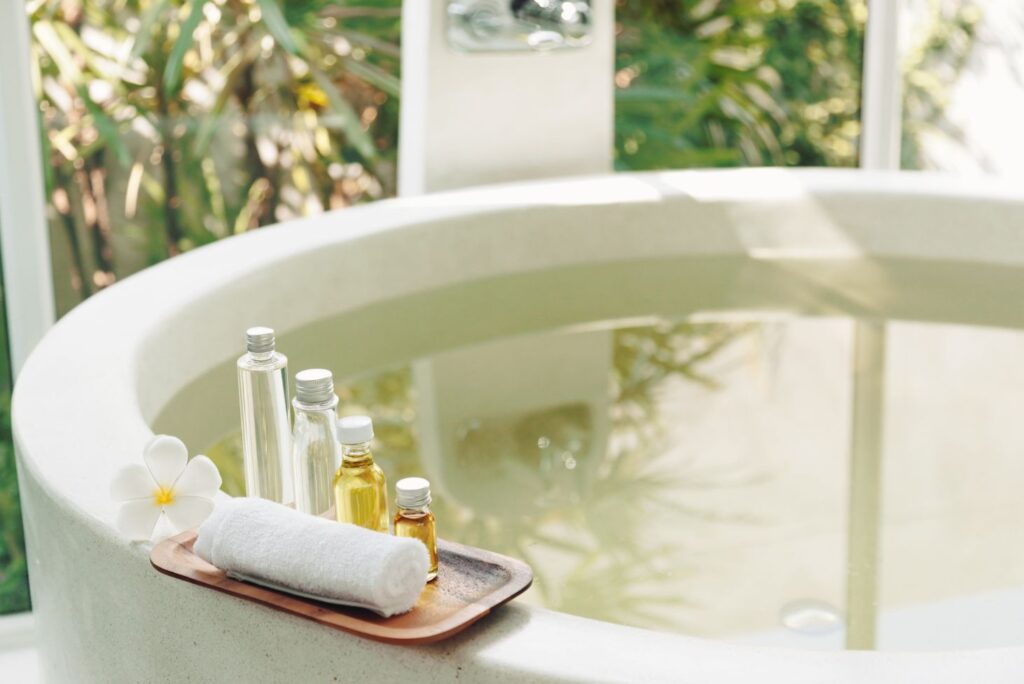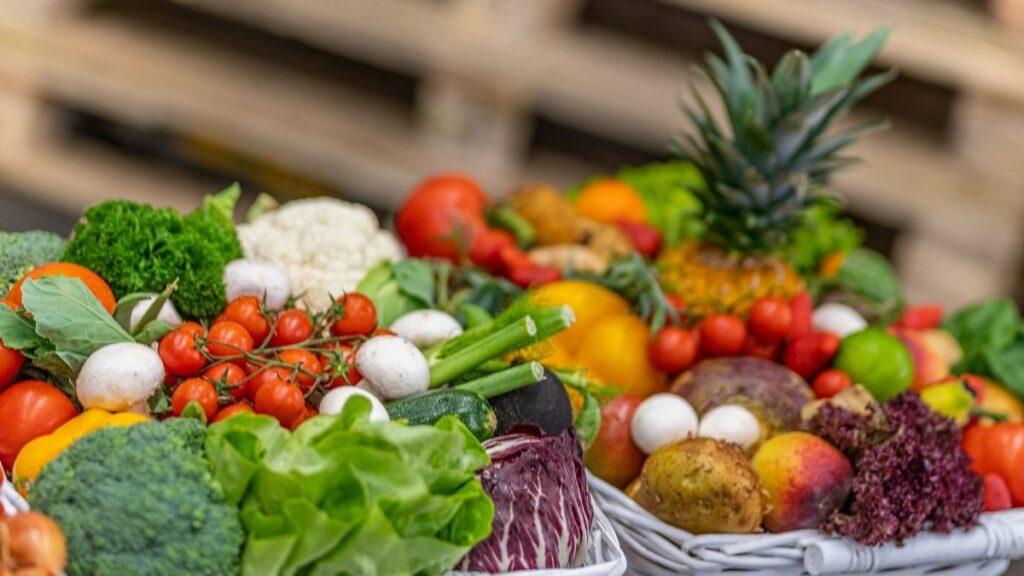Looking for the best natural remedies for PMS? Continue reading and discover the absolute best PMS remedies with herbs.
Premenstrual syndrome (PMS) is a term used to describe the symptoms that occur in women 1-12 days before menstruation. Some of the most common PMS symptoms are fatigue, lack of energy, depression and anxiety, tender breasts, bloating and cramps, mood swings, migraines, back pain and body pain, changes in appetite, etc. But the most annoying PMS symptom is the change in mood, increased irritability, and low mood. In this article, we want to explore exactly the best natural remedies for PMS, namely irritability, and low mood.

In This Article You Will Find:
Most Common PMS Symptoms
- depression or anxiety
- irritability, mood swings, the tendency to cry for minor reasons
- panic attacks
- lack of appetite or increased appetite
- joint or muscle pain
- difficulty concentrating or memory loss
- headache or back pain
- stomach upset, bloating, constipation or diarrhea
- sleeping problems
- fatigue
- tender breasts
- acne
It is estimated that 75% of fertile women have some form of PMS, and 10% of them have severe symptoms (premenstrual dysphoric dysfunction – PDD).
What Actually Causes PMS?
The cause of PMS is yet unknown, but the most common hypothesis is the fluctuations in female sex hormones, namely estrogen and progesterone. Low serotonin levels have also been associated with PMS. Scientists have observed that the higher the estrogen level, the higher the risk of PMS. There is some evidence linking the hypothalamus, pituitary gland, and ovary disorders to PMS. On the other hand, nutritionists agree that PMS is due to the overaturation of the body with toxins from foods and the environment.
But the most plausible explanation comes from intuitive healer and best-selling author, Anthony William, who explains that when a woman menstruates, her immune system drops considerably. Add weakened adrenals (which most women have, as they run on caffeine which corrodes the adrenals) to the mix and you have a recipe for PMS disaster. A lowered immune system is the perfect terrain for pathogens to thrive, and create havoc. The more overburdened a woman’s body is with pathogens, toxic heavy metals, and other toxins, and the weaker her adrenals, the more severe her PMS will be.
This also explains why PMS symptoms vary so much from one woman to another. Thus, the first thing to do when suffering from PMS is to follow an anti-inflammatory diet to support your immune system. Finding ways to unwind and relieve potential stressful situations (stress is an immunosuppressor) is one of the best ways to take care of yourself before and during menstruation. In addition to clean and nourishing foods, there are natural remedies for PMS that actually work. Let’s get straight to them.
13 Best Natural Remedies for PMS (Premenstrual Syndrome)
1. Raspberry Buds & Leaves
(Rubus idaeus)
Raspberry buds are a real elixir for PMS, because they have a similar effect to progesterone, and relieve many of the specific symptoms of premenstrual syndrome and dysmenorrhea, such as breast pain, abdominal cramps, irritability, and anger. Raspberry buds are harvested in early spring and can be crushed and preserved in raw honey, or dried and turned into powder (1 teaspoon four times a day).
- For a more powerful effect, finely grind equal amounts of angelica seeds (Angelica archangelica), lady’s mantle herb (Alchemilla vulgaris), and raspberry buds using an electric coffee grinder.
- The dosage is 1 teaspoon 4 times a day.
- Keep the powder under the tongue for 10-15 minutes, then swallow with a little bit of water. This is a 3 months treatment.
- Raspberry buds can also be used as glycerinated extract – 50 drops, twice a day for at least 28 days.
Raspberry leaves are harvested in the summer before the raspberries start to ripen, as this is when they are very rich in phytohormones. After drying them in the shade, turn them into a powder. The dosage is 1 teaspoon 4 times a day, on an empty stomach. Keep the powder under the tongue for a few minutes, then swallow with a little bit of water. This is a 28-day treatment. Pause for one week and resume if needed. Raspberry leaf powder helps regularize menstruation, eliminate unpleasant PMS symptoms, and prevent other gynecological conditions due to hormonal imbalances. Raspberry leaves are one of the best natural remedies for PMS.
2. Vitex
(Vitex agnus-castus)
Vitex is a natural female hormone regulator and is a powerful medicinal plant known for its beneficial effect on PMS syndrome and amenorrhea. Similar to raspberry leaf, vitex has a progesterone-mimicking effect that can help balance the menstrual cycles, especially when very late or missing. According to multiple studies, Vitex is effective and well-tolerated in the treatment of moderate to severe PMS. I have personally used Vitex supplements a few years back when I started missing periods, which was unusual for me. I started taking a Vitex extract and before finishing one bottle of capsules, I had my period back and I haven’t missed it since. This is undoubtedly one of the best natural remedies for PMS.
3. Lady’s Mantle, Shepherd’s Purse & Dill Tincture
(Alchemilla vulgaris)
This remedy is effective for painful, heavy, or irregular menstrual cycles, sterility (alongside a hypomenorrhea treatment), and PMS, namely breast pain, abdominal cramps, and mood changes before menstruation. To make this tincture you need three very powerful herbs for PMS.
- Roughly grind dill seeds, lady’s mantle (Alchemilla vulgaris), and shepherd’s purse (Capsella bursa-pastoris).
- Combine 5 teaspoons of dill seed powder, 10 teaspoons of lady’s mantle powder, and 5 of shepherd’s purse in a glass jar. Pour strong food-grade alcohol over the plants (45-50 degrees), enough to cover them.
- Seal the jar and leave it to macerate for 10-12 days.
- Strain through cheesecloth and pour the tincture into small, amber bottles.
The dosage is 1 tablespoon of tincture diluted in a cup of water, 3 times a day, on an empty stomach. The treatment lasts at least 2 months. This tincture is one of the most effective natural remedies for PMS. Tip! If you want to use this remedy for heavy bleeding, it is recommended to drink large amounts of sage and shepherd’s purse tea while menstruating.

4. Herbal Blend for PMS
This PMS remedy is from an old Romanian midwife from a small village in Transylvania. For the remedy you will need the following fresh plants (ideally):
- two parts of silverweed, lady’s mantle, yarrow, chamomile, marjoram
- one part of lady’s bedstraw, lemon balm, and lavender flowers
Steep a spoonful of the herbal blend into a cup of boiling water for 10 minutes, then strain. Start drinking one cup of this tea daily, two weeks before menstruation, and continue until the second day of your period. Pause and start again 14 days before the next period. Ideally is best to use fresh herbs, but in the autumn and winter, or if you don’t have the fresh herbs, you can prepare the recipe with dried herbs.

5. Verbena
(Verbena officinalis)
In traditional Asian medicine, common verbena is considered among the most powerful remedies for breast and ovarian pain, low mood, depression, anxiety, and headaches related to premenstrual syndrome. Taken during menstruation, verbena reduces menstrual cramps, and ovary pain, and alleviates low moods caused by PMS. The best way to use verbena for PMS is as a tincture (one tsp three to four times a day). In the case of heavy bleeding, drinking one liter (4 cups) of combined verbena infusion is recommended.

6. St John’s Wort
(Hypericum perforatum)
Some studies show that the mood of women with PMS can be greatly improved with the help of St. John’s wort. Symptoms such as irritability, depression, lack of attention and focus, and hyperexcitability, all related to the period before menstruation or even during menstruation, are reduced with the use of this simple herb. Similar effects have been noted in the case of premenopausal disorders. To reduce PMS symptoms, have one teaspoon of St. John’s wort powder four times a day for 28 days. Pause for 10-14 days and resume if necessary. This is one of the best natural remedies for PMS, especially for depression and anxiety that accompany menstruation.
7. Ginkgo Biloba
A study done in 1993, on 165 patients aged between 18 and 45, suffering from PMS, showed the effectiveness of this plant. More than 80% of women who took ginkgo reported a significant reduction in irritability, depression, or fatigue, which initially appeared before menstruation. More recent studies show that ginkgo can reduce the severity of PMS symptoms, hence there are clinical studies that attest to the fact that ginkgo is one of the best natural remedies for PMS.
8. Yellow Sweet Clover
(Melilotus officinalis)
In a pilot study, conducted on 15 patients diagnosed with PMS, yellow sweet clover was administered 7-10 days before the start of the menstrual cycle, and until the last day of the menstruation. The dosage was 3 grams of powder, three times a day, in the morning, at lunch, and in the evening. At the end of this study, an overwhelming number of the participants (87%!!!), reported that they had a significant improvement in some PMS symptoms such as breast pain, irritability, and ovarian pain.
Yellow sweet clover powder is also effective for hypermenorrhea (abundant menstrual cycle) and dysmenorrhea (painful menstrual cycle), due to its astringent (reduces bleeding) and antispasmodic (calms cramps) properties. This is undoubtedly one of the most effective natural remedies for PMS.

9. Valerian Root Tincture
(Valeriana officinalis)
Valerian root is an adjuvant in premenstrual syndrome due to its relaxation-inducing and stress-relieving properties. To enjoy its benefits, you can follow a one-week treatment with valerian root tincture. The dosage is 2-3 teaspoons daily, starting approximately 5 days before menstruation, and continuing until the second day of the menstrual cycle. Valerian root greatly reduces irritation and anger, breast pain, ovarian pain, tension, or heaviness in the pelvis, related to PMS, making it one of the best natural remedies for PMS.
10. Passion Flower Powder
(Passiflora incarnata)
Passion flower powder is an amazing remedy for menstrual pain and PMS. You can use it over one month by taking 2-3 g of passion flower powder per day. According to studies, passion flower can prevent irritability and fatigue related to PMS. This PMS remedy is also useful for menstrual cramps, with uterine spasms, and for anxiety and depression related to menstruation.
11. Linden Flowers Tea
(Tilia sp.)
Linden flowers are a known remedy for irritability, as they have a soothing effect on the central nervous system, and thus are one of the top natural remedies for PMS. To reduce PMS symptoms, drink a combined linden flower infusion three times a day, in 28-day courses. This remedy is recommended for premenstrual syndrome, premenopause, or menopause syndrome, as well as for people suffering from emotional problems caused by insomnia, and mental exhaustion.
12. Juniper Berries
(Juniperus communis)
In the countries of northern Europe, the juniper berries cure is a traditional treatment for irritability, breast and ovarian pain, abdominal cramps, and low moods that precede menstruation. The scientific explanation of the calming effect of juniper berries is the double regulatory action of the plant on the central nervous system and the gonads. As a PMS remedy, you can do the juniper berries cure once every two months, starting from the last day of menstruation.

13. Corn Silk
(Stigma maydis)
The natural hormones and antispasmodic substances in corn silk reduce the discomfort during menstruation by regulating the endocrine balance. The combined infusion and dry corn silk extract are recommended before and during menstruation, to reduce pain, bloating, uterine spasms, as well as depression or irritability. This PMS remedy can be administered one week out of a month, the treatment starting 2-3 days before the onset of menstruation.
Herbal Baths for PMS
In addition to the natural remedies for PMS above, herbal baths can make a huge difference in mood. These herbal baths are amazing for PMS, for relieving irritability, breast pain, bloating and intestinal transit disorders, stomach pain, and vomiting. Here’s how to prepare this healing and relaxing bath:
- Put 5 tablespoons of chamomile flowers and 5 tablespoons of linden flowers in two liters of water, at room temperature, for eight to ten hours (from morning to afternoon).
- Strain the cold maceration and set aside.
- Put the soaked/used plants in another two liters of boiling water and steep covered until the infusion cools down, and strain.
- Finally, combine the two preparations (the cold maceration and the cooled infusion), and pour them into your bath water, at a temperature of 38-39°C/100-102°F.
- Bathe for 15-20 minutes.

Best Foods for PMS
The golden rule for menstrual disorders is this: eat as many fresh vegetables and fruits as possible. To prevent PMS, eat plenty of fresh fruit, vegetables, leafy greens, and legumes starting 14 days before menstruation. Here are some of the best foods for PMS recommended by Medical Medium, as they boost immune function and support the reproductive system:
- wild blueberries
- sesame tahini
- avocados
- black beans
- asparagus
- apples
- spinach
- black grapes
- cucumbers
- raspberry leaf
- nettle leaf
- chastetree berry
- elderberry
These foods provide antioxidants and other nutrients that help fortify vital organs and reduce inflammation, thus preventing and reducing PMS symptoms. In addition, here are other foods to consider for PMS.
- Magnesium Rich Foods – a series of studies highlight the fact that women with PMS often have low levels of magnesium. When magnesium is insufficient, it can also lower dopamine, a neurotransmitter that influences mood, just like serotonin. Women who do not eat enough fresh vegetables run the risk of not meeting their daily magnesium needs.
- Calcium & Vitamin D Rich Foods – some studies say that women who get about 1200 milligrams of dietary calcium and 400 IU of vitamin D daily have a minimal risk of PMS. Calcium is found in sesame seeds, lemon juice, almonds, broccoli, collard greens, winter cabbage, and Chinese cabbage (Pak Choi), while Vitamin D is found in wild salmon, sardines, and … exposure to sunlight.
- Omega 3 Foods – Omega-3 has a positive role in preventing both PMS and some menopause symptoms. Two of the main Omega-3 fatty acids: EPA (eicosapentaenoic acid) and DHA (docosahexaenoic acid) are found in (preferably small) ocean fish (mackerels, herrings, sardines), and wild salmon, but also in seaweed. Vegans can opt for other Omega-3 acids sources, namely: alpha-linolenic acid (from walnuts, as well as from flax, hemp, chia, or perilla seeds) and gamma-linolenic acid (from evening primrose oil, hemp, currants, or borage).
- Sea Buckthorn – fresh (with honey) or as oil (60 drops per day) is a champion in vitamin A and vitamin E, both of which reduce the symptoms of premenstrual syndrome and dysmenorrhea.
- Phytoestrogens – beans, black beans, lima beans, or raw peanuts.

Premenstrual Syndrome Prevention
In addition to the natural remedies for PMS and the best foods to eat for PMS, here is what to avoid by all means.
- Processed beat sugar and artificial sugar replacers – PMS can cause an increased appetite for sweets. Replace sugar/sweets with dates, ripe fruit, maple syrup, coconut sugar, or raw honey.
- Coffee and caffeinated drinks – caffeine amplifies PMS and dysmenorrhea, in particular menstrual cramps and spasms, anxiety and irritation, and low moods. The reason is that caffeine weakens the adrenals. Avoid coffee, green tea, black tea, matcha, mate, guarana, cacao, and chocolate – replace with rooibos or herbal teas.
- Animal proteins – meat, eggs, and dairy aggravate unpleasant PMS, as they feed pathogens and lower immunity. Replace with wild salmon, wild trout, wild sardines, mushrooms, and legumes.
- Fast foods, and hydrogenated fats – aggravate abdominal cramps during menstruation, digestive disorders, headaches, and muscle pains, as they overburden the liver and weaken immunity. Reduce all fats to a minimum.
- Alcohol and smoking (including vaping) – alcohol numbs white blood cells, thus weakening natural immunity, and causing serious disturbances in the nervous and endocrine systems. Avoid alcohol, smoking, and vaping at all costs.
Regular light physical exercises increase the release of endorphins, substances that induce calm and pleasure in the brain and, thus, reduce pain and invite well-being. Do not do strenuous exercise, such as HIIT or something similar as you only exhaust the body. Instead, 30 minutes of regular walking a day, or yoga and stretching is enough. If possible, take a walk in a park or forest for added benefits.
Read Also: 10 Absolute Best Herbs for Endometriosis
If you’ve enjoyed learning about these natural remedies for PMS and how to use herbs for PMS symptoms, please share this article so more women can use this information. Let us know in the comments below what is your go-to remedy for PMS. Stay healthy and happy, naturally!
Share on Pinterest ❤️

